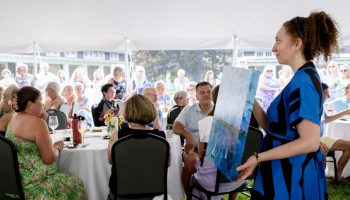During Week Two, on the subject of “Money and Power,” the Tuesday lecturer was Mehrsa Baradaran, law professor and author of the book How the Other Half Banks. Mehrsa was born in Iran and immigrated to the United States in 1986 with her family. After her speech, Mehrsa accepted our invitation to spend more time at Chautauqua to take in the work of other presenters and participate in the life of the community as a Chautauquan.
The day after her talk she was accosted in the lobby of the Athenaeum Hotel by what she described as a hulking, threatening man who expressed in vehement terms that Muslims are not welcome in Chautauqua or in this country. He went on at some disturbing length until a man in the area gently took her elbow and led her out of the lobby while offering soothing and comforting assurances of the unusual nature of that behavior at Chautauqua.
I have a feeling the man hurling the invectives probably wasn’t capable of shame. So I feel ashamed for him.
I tell myself that those events, those aberrations from the goodwill that normally describe the experience of this assembly, simply serve as evidence that the human undertaking here is real. All of us can be small and cruel and thoughtless. We all have those hot-button issues that can inflame our sense of moral or ideological outrage. Recognized or not, we have our biases and our thresholds wherein intolerance is invoked. Indeed, our media-saturated culture celebrates those inclinations. What serves as our political culture indulges those expressions at the expense of thoughtful, intense and reasoned discussion and debate.
And we begin this week of the Chautauqua season in the ether of one political convention and at the onset of that of the competing party. Each a gathering of the faithful designed through applause, shouted red-meat lines and booing of the caricatures of the competing side. Those activities are part of our election process. They are important to the process they serve. They are part of the fabric of our democratic system.
We offer a different proposition here. You are invited to an assembly dedicated to lifelong learning, to the exploration of what it is to be human and to the further consideration of what it is to be a good, just, contributory human. Those are not neutral subjects. They surface value choices and other judgments of reason and ethical codes. In many ways, the very issues fundamental to our civic governance are at play in our program. Yet here the idea of cheering, booing and chanting slogans is anathema to our purpose.
We ask of ourselves the effort to appreciate critical thinking, effective oratory and moral imagination. Our politics, party or ideologies are not at risk in this environment. Indeed, we are invited to explore differing points of view and experiences. An honest and civil exploration of these differences may, on occasion, influence our point of view. Most importantly, we may find that although we remain fixed in our beliefs, we actually can appreciate the critical reasoning and diligence of mind and spirit represented in those opposing views. One might be inspired to applaud such a presentation purely for such an appreciation.
Frankly, that approach is not inconsistent with a sense of moral outrage toward certain propositions. Nor does it conflict with passionately held views of public finance or the obligations of society to those in greatest need. But this culture is different than the media-driven orgy of unbridled emotion. We can and should acknowledge that within our differences of mind and conviction we live together. Our opportunities to find a way through those differences increase exponentially by that acknowledgement and our civil engagements.
Whoever it was that walked Mehrsa out of the hotel lobby exemplified the best of what can happen in this very special place. I know that expression of thoughtful kindness is ubiquitous on these grounds. I thank that gentleman and all of you for your care for the nature of this assembly.
And not that it matters, but Mehrsa is a Mormon.





